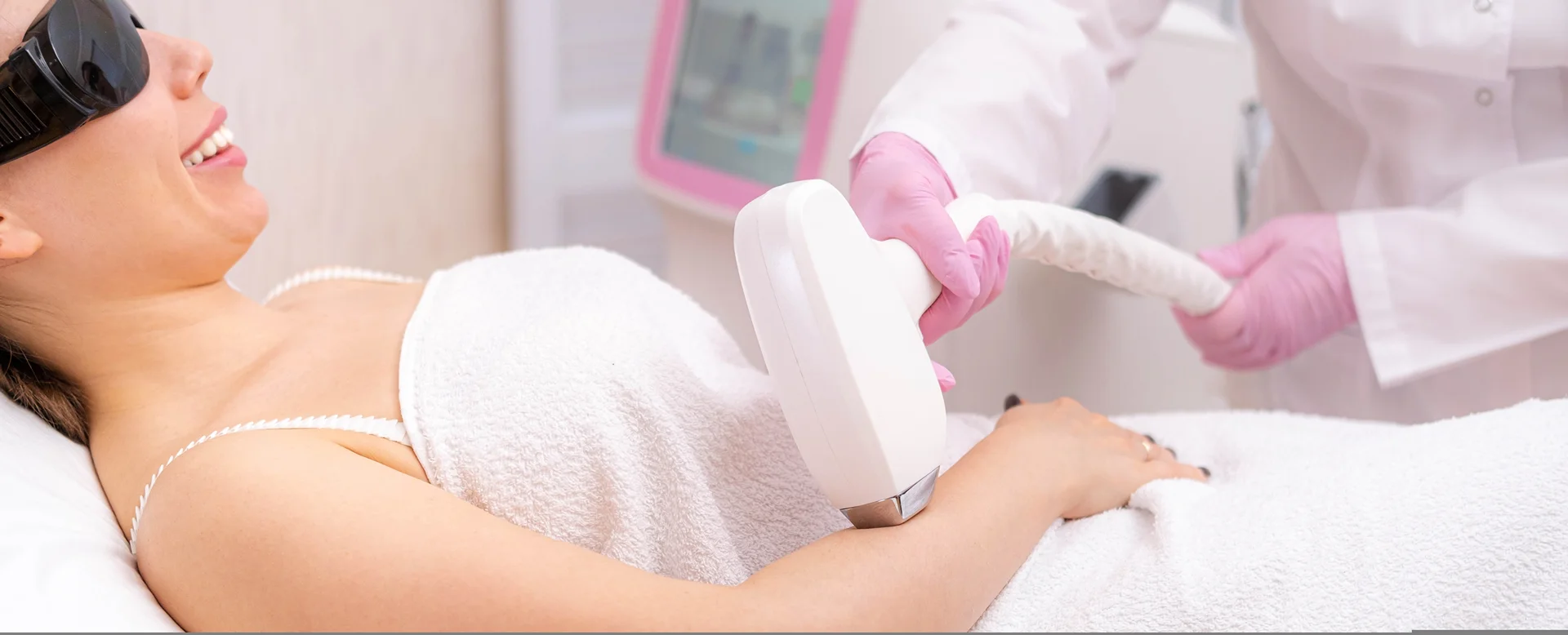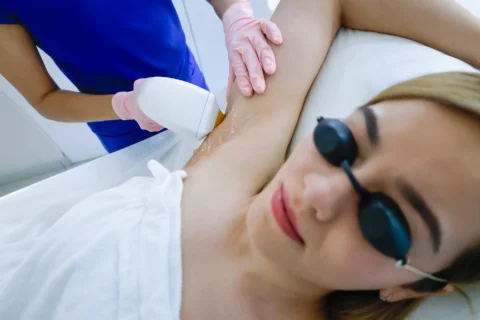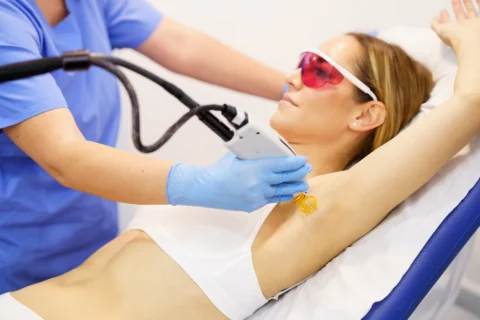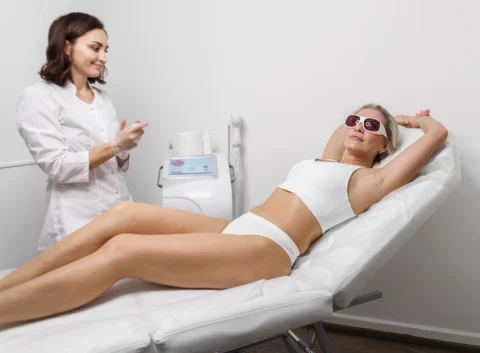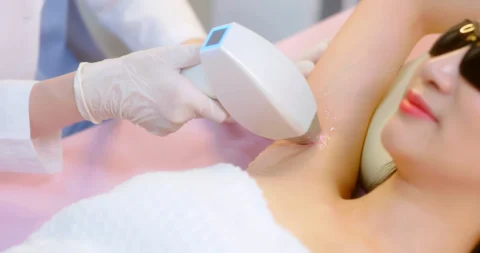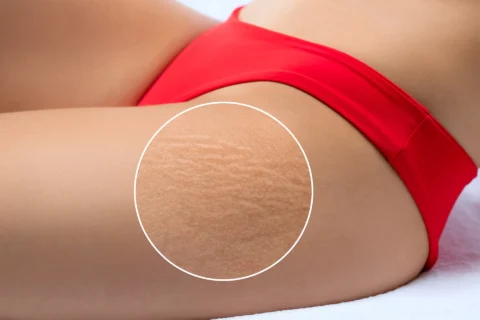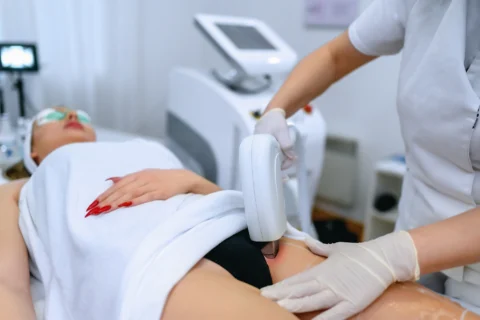One of the most common concerns we hear from our clients is about excessive sweating and body odor caused by underarm, bikini and body hair.
Thick hair in sweat-prone areas can exacerbate discomfort, especially during the summer months. The question we get asked frequently is: can laser hair removal provide a lasting solution?
As pioneers in safe, customized laser treatments, we at Ethos Spa are committed to delivering the facts about laser hair removal.
The Struggle With Sweating During Summer
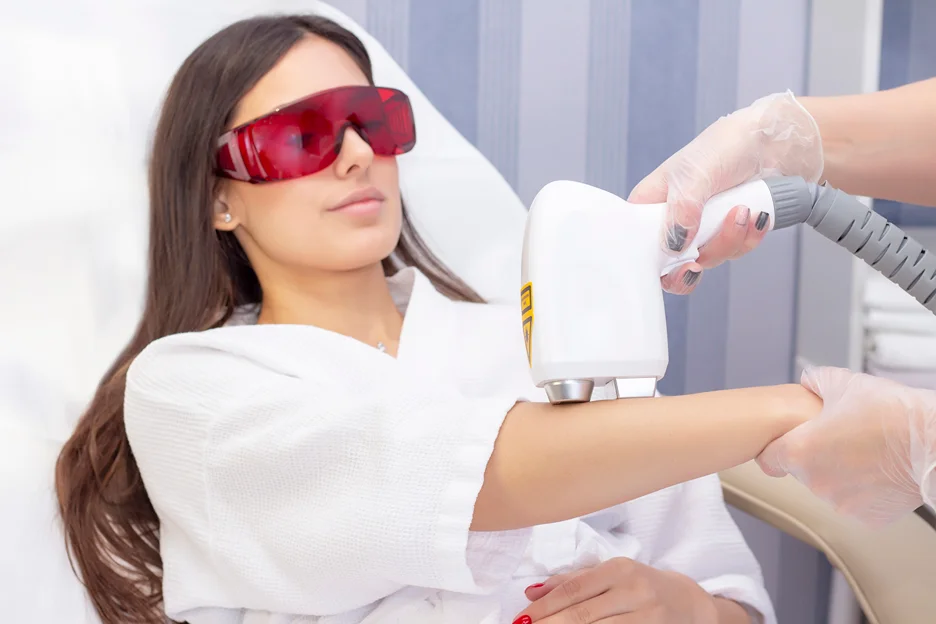
For many, summertime heat brings embarrassment, discomfort, and frustration. Profuse underarm perspiration can hamper daily activities and intimate moments alike.
The struggle becomes how to manage sweat and odor in a lasting way. With innovative laser technologies promising permanent hair reduction, the idea of zapping away unwanted underarm, bikini, and body hair once and for all is enticing.
But does targeting the hair follicle with laser light actually decrease sweating too? Can it help control excessive armpit moisture and smelly pits? Or will sweat pour forth unabated without the forest of hair to catch it?
How Does Laser Hair Removal Work?
Laser hair removal has skyrocketed in popularity in recent years as a growing number of people seek to be freed from tedious hair maintenance routines.
Waxing, shaving, plucking, and depilatories all provide temporary relief. But laser stands apart with its ability to deliver long-term hair reduction by disabling follicles at the root.
Rather than just singeing hair at the surface, laser penetrates down into the skin to target and damage the germinative hair matrix inside the pore where growth begins.
The precisely focused light beam is attracted to the melanin pigment naturally present in hair. When absorbed by the follicles, the laser heat essentially kills them by preventing the formation of new hair cells.
Treatments are tailored to your specific skin and hair color. Multiple sessions are required to catch follicles at the right point in the growth cycle.
But eventually most hair can be stopped in its tracks before it ever breaches the surface. Virtually any area of the body can benefit, including the face, underarms, arms, legs, back, bikini line, and more.
With repeated treatments, the result is up to 90% permanent hair reduction. What’s not to love?
Yet, the question remains—does zapping away all that bountiful pit hair actually reduce sweating too?
Why Do We Sweat So Much In Certain Areas?
To understand whether tampering with hair follicles impacts perspiration, we must first examine the biology of how and why we sweat. Sweating is a critical bodily function driven by the sympathetic nervous system.
When we get hot, nerves signal our two to four million sweat glands to release moisture to the skin’s surface. This moisture quickly evaporates, cooling us down. We have two main types of sweat glands:
- Eccrine glands: Found across most of the body, eccrines secrete a watery substance and are most linked to thermal cooling.
- Apocrine glands: Concentrated in the armpits and groin, apocrines emit a fattier sweat that provides nutrition for bacteria, causing odor as it breaks down.
Of the two, eccrines are vastly more numerous and essential for body temperature regulation. In fact, some disorders lead to inadequate sweat production (anhidrosis), which can cause heat stroke and prove fatal if left untreated. We literally cannot live without the ability to sweat!
Can Laser Treatments Reach Deep Enough To Impact Sweat Glands?
Herein lies the crucial point—laser hair removal only disables hair follicles, not sweat glands.
The light wavelength is specifically attracted to melanin in hair and absorbed by those structures. However, the eccrine and apocrine glands that actually manufacture and excrete sweat reside much deeper in the dermis layer of skin.
Laser cannot penetrate to those depths to damage sweat production. In essence, destroying hair follicles simply has no direct effect on the secretory function of underlying sweat glands. They remain intact and ready to do their job.
Why Do Some People Say It Helps With Sweating?
However, some providers and clients insist decreasing hair density does noticeably lessen sweat, especially in heat-prone spots like the underarms. A few hypotheses may account for this discrepancy.
First, with a forest less dense pit hair, sweat may wick off the skin surface more rapidly rather than accumulating on hair shafts.
Second, aerating the underarm may create a cooler microclimate less conducive to sweating.
And third, minimizing hair could mean one less factor trapping sweat against the skin, improving evaporation.
Additionally, reducing apocrine-rich pubic hair could theoretically decrease some odor-causing sweat. But in reality, the difference is negligible. Just as hairy folks can have minimal BO and bald folks stinky pits, sweat itself has no odor.
Bacteria feasting on its fatty compounds create the stench. Shaving armpits does not resolve excessive sweating; nor does removing pubes eliminate body odor.
Laser hair removal provides no certain sweat relief either. For some it may subjectively help, for others not. Objective clinical studies remain limited.
What Does The FDA Say About Sweat Reduction Claims?
In fact, the U.S. Food & Drug Administration has called out numerous laser hair removal clinics for making unsubstantiated claims about sweat and odor reduction. Warning letters emphasize such statements are not backed up by scientific evidence. Consumer testimonials do not amount to clinical proof.
At best, the sweat and smell benefits of laser hair removal are considered ancillary and inconsistent.
Prescription Strength Options
For excessive underarm sweating, talk to your dermatologist about:
- Prescription antiperspirants: Aluminum-based products like Drysol stop sweat at the gland ducts.
- Botox injections: Botulinum toxin temporarily paralyzes sweat production.
- Medical procedures: Curettage surgically scrapes away sweat glands, while liposuction or laser eliminate the glands.
These advanced treatments directly target sweat production through proven means. While not always 100% curative, they offer substantially more reliable results than any from laser hair removal.
The Bottom Line
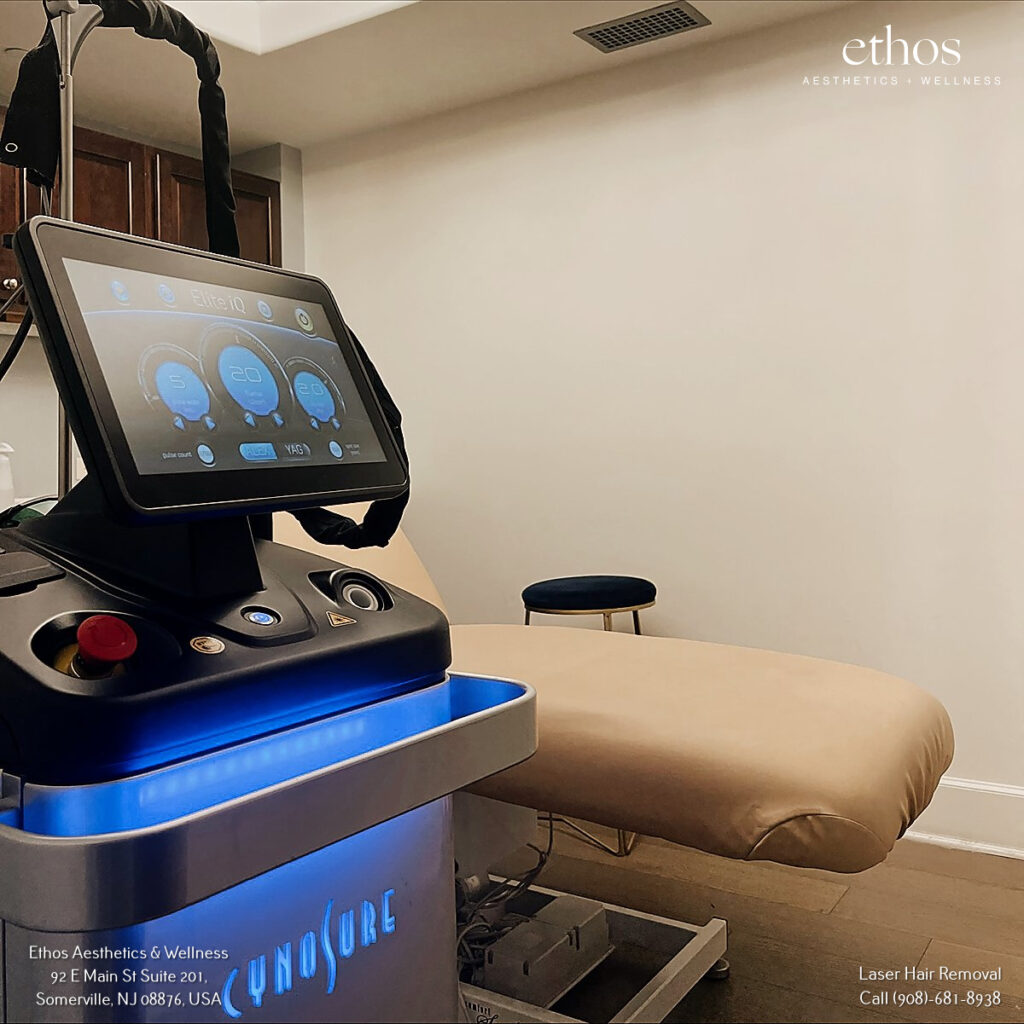
Can laser hair removal help control excessive sweating as a welcome side effect? Occasionally, yes. But only indirectly and minimally for some. It cannot cure hyperhidrosis. Lasers target the hair follicle alone; sweat glands lie deeper beyond reach. No solid clinical evidence proves lasers prevent sweat or odor. Any reduction is variable and inconsistent.
Still, destroying hair growth can make you feel fresher by decreasing trapped moisture. Just do not expect lasers to be an “antiperspirant” too. And consider proven prescription therapies to treat profuse pit-sweating at its secretory source—the unchecked sweat glands.
At Ethos Spa, we believe clear, truthful information empowers our clients to make the best decisions for their needs.
While laser hair removal is highly effective for achieving smooth skin, results vary when it comes to reducing sweating and body odor. As a top laser hair removal provider, we deliver realistic expectations, customized treatment plans and follow-up care focused on your unique goals

